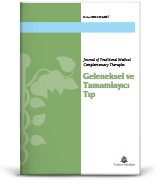Objective: Our study aims to examine whether patients' perspectives on traditional and complementary medicine (T&CM) are affected by the coronavirus disease-2019 (COVID-19) pandemic. Material and Methods: Our study is cross-sectional descriptive. The population consists of patients aged 18 years and older who applied to the family medicine outpatient clinic of a university hospital between January 2022 and June 2022. Healthcare workers were excluded from the study to avoid medical bias. A sociodemographic questionnaire consisting of 18 items and a T&CM Attitude Scale consisting of 27 items prepared by McFadden et al. were administered to the participants. A pilot study was conducted with 38 people. According to the pilot study results, the sample calculation was made, and the study was carried out with 450 people. Results: Post-COVID-19 scores were significantly higher in the T&CM Attitude Scale total score and in the sub-dimensions of ''view of traditional medicine'', ''dissatisfaction with modern medicine'', and ''holistic view of health'' (p<0.001). The increase in the total score on the T&CM Attitude Scale was more evident in those who had used any T&CM method before, in those whose family members had used the T&CM method, and in those who found T&CM methods useful (all p<0.001). There was no significant difference in the total score between those with COVID-19 infection and those without (p=0.215). Conclusion: The view for T&CM was found to increase positively after the COVID-19 pandemic, and this positive outlook was independent of being infected with COVID-19.
Keywords: Traditional medicine; complementary medicine; COVID-19
Amaç: Çalışmamız, hastaların geleneksel ve tamamlayıcı tıbba (GETAT) bakış açılarının koronavirüs hastalığı-2019 [coronavirus disease-2019 (COVID-19)] pandemisinden etkilenip etkilenmediğini incelemeyi amaçlamaktadır. Gereç ve Yöntemler: Çalışmamız kesitsel tanımlayıcı tipte bir çalışmadır. Çalışmanın evrenini bir üniversite hastanesinin aile hekimliği polikliniğine Ocak-Haziran 2022 tarihleri arasında başvuran 18 yaş ve üzeri hastalar oluşturmaktadır. Tıbbi yanlılığı önlemek için sağlık çalışanları çalışmaya dâhil edilmemiştir. Katılımcılara McFadden ve ark. tarafından geliştirilen ve 27 maddeden oluşan GETAT Tutum Ölçeği ve araştırmacılar tarafından hazırlanmış 18 maddelik bir sosyodemografik anket uygulanmıştır. Otuz sekiz kişi ile pilot çalışma gerçekleştirilmiş ve pilot çalışmanın sonuçlarına göre örneklem hesabı yapılarak ve 450 kişi ile çalışma tamamlanmıştır. Bulgular: GETAT Tutum Ölçeği toplam puan ve ''geleneksel tıbba bakış'', ''modern tıbba karşı memnuniyetsizlik'' ve ''sağlığa bütüncül bakış'' alt boyutlarında COVID-19 pandemisi sonrası puanlar COVID-19 pandemisi öncesine göre anlamlı derecede daha yüksekti (p<0,001). Daha önce herhangi bir GETAT yöntemi kullanmış olanlarda, ailesinden birisi GETAT yöntemi kullanmış olanlarda ve GETAT yöntemlerini faydalı bulanlarda GETAT Tutum Ölçeği'nden alınan toplam puan artışı daha belirgindi (hepsi p<0,001). COVID-19 enfeksiyonu geçirenlerle geçirmeyenler arasında toplam puan açısından anlamlı fark yoktu (p=0,215). Sonuç: Hastaların GETAT tutumlarının COVID-19 pandemisi sonrasında pozitif olarak arttığı görülmüştür ve bu olumlu artış COVID-19 enfeksiyonu geçirmekten bağımsızdır.
Anahtar Kelimeler: Geleneksel tıp; tamamlayıcı tıp; COVID-19
- Geerts JM, Kinnair D, Taheri P, Abraham A, Ahn J, Atun R, et al. Guidance for health care leaders during the recovery stage of the COVID-19 pandemic: a consensus statement. JAMA Netw Open. 2021;4(7):e2120295. [Crossref] [PubMed]
- Khabour OF, Hassanein SFM. Use of vitamin/zinc supplements, medicinal plants, and immune boosting drinks during COVID-19 pandemic: A pilot study from Benha city, Egypt. Heliyon. 2021;7(3):e06538. [Crossref] [PubMed] [PMC]
- Parlak AG, Akgün Şahin Z. Covid-19 pandemisinde yaşlı bireylerin kullandıkları geleneksel ve tamamlayıcı tıp yöntemlerinin belirlenmesi: Tanımlayıcı kesitsel araştırma [Determination of traditional and complementary medicine methods used by elderly people in the COVID-19 pandemic: A descriptive cross-sectional research]. J Tradit Complem Med. 2023;6(1):40-7. [Crossref]
- World Helath Organization [Internet]. © 2021 WHO [Cited: May 10, 2023]. WHO global report on traditional and complementary medicine. Geneva: World Health Organization; 2019. Available from: [Link]
- Peng Y, Tao H, Satyanarayanan SK, Jin K, Su H. A comprehensive summary of the knowledge on COVID-19 treatment. aging Dis. 2021;12(1):155-91. [Crossref] [PubMed] [PMC]
- Deniz Doğan S, Kaya P. Bireylerin tıbbi ve aromatik bitki kullanımı ve görüşleri: Tanımlayıcı bir çalışma [Medicinal and aromatic plant use and opinions of individuals: a descriptive study]. J Tradit Complem Med. 2023;6(1):43-8. [Crossref]
- Kim TH, Kang JW, Jeon SR, Ang L, Lee HW, Lee MS. Use of traditional, complementary and integrative medicine during the COVID-19 pandemic: a systematic review and meta-analysis. Front Med (Lausanne). 2022;9:884573. [Crossref] [PubMed] [PMC]
- McFadden KL, Hernández TD, Ito TA. Attitudes toward complementary and alternative medicine influence its use. Explore (NY). 2010;6(6):380-8. [Crossref] [PubMed] [PMC]
- Köse E, Ekerbiçer HÇ, Erkorkmaz Ü. Complementary, alternative and conventional medicine attitude scale: Turkish validity reliability study. Sakarya Med J. 2018;8(4):726-36. [Crossref]
- Teke N, Özer Z, Bahçecioğlu Turan G. Analysis of health care personnel's attitudes toward complementary and alternative medicine and life satisfaction due to COVID-19 pandemic. Holist Nurs Pract. 2021;35(2):98-107. [Crossref] [PubMed]
- Patra M, Hamiduzzaman M, McLaren H, Siddiquee NA. A scoping review of changes to patient-doctor communication during COVID-19. Health Commun. 2022:1-24. [Crossref] [PubMed]
- Kludacz-Alessandri M, Hawrysz L, Korneta P, Gierszewska G, Pomaranik W, Walczak R. The impact of medical teleconsultations on general practitioner-patient communication during COVID- 19: A case study from Poland. PLoS One. 2021;16(7):e0254960. [Crossref] [PubMed] [PMC]
- Millstein JH, Kindt S. Reimagining the patient experience during the COVID-19 pandemic. NEJM Catal Innov Care Deliv. 2020;1(3). [Link]
- Deriba BS, Geleta TA, Beyane RS, Mohammed A, Tesema M, Jemal K. Patient satisfaction and associated factors during COVID-19 pandemic in north shoa health care facilities. Patient Prefer Adherence. 2020;14:1923-34. [Crossref] [PubMed] [PMC]
- Lam CS, Koon HK, Chung VC, Cheung YT. A public survey of traditional, complementary and integrative medicine use during the COVID-19 outbreak in Hong Kong. PLoS One. 2021;16(7):e0253890. [Crossref] [PubMed] [PMC]
- Badakhsh M, Dastras M, Sarchahi Z, Doostkami M, Mir A, Bouya S. Complementary and alternative medicine therapies and COVID-19: a systematic review. Rev Environ Health. 2021;36(3):443-50. [Crossref] [PubMed]
- Ling CQ. Complementary and alternative medicine during COVID-19 pandemic: What we have done. J Integr Med. 2022;20(1):1-3. [Crossref] [PubMed] [PMC]
- Göktaş M. Eğitim ASM'ye başvuran hastaların getat (geleneksel ve tamamlayıcı tıp) kullanım durumu, getat hakkındaki tutum ve davranışları [Tıpta uzmanlık tezi]. İstanbul: Sağlık Bilimleri Üniversitesi; 2020. [Erişim tarihi: 20 Mayıs 2023]. Available from: [Link]







.: Process List